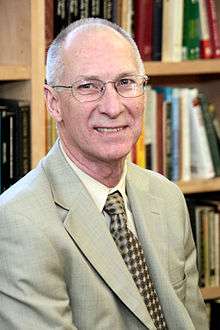Robert Higgs
Robert Higgs (born 1 February 1944) is an American economic historian and economist combining material from Public Choice, the New institutional economics, and the Austrian school of economics; and describes himself as a libertarian anarchist[1] in political and legal theory and public policy. His writings in economics and economic history have most often focused on the causes, means, and effects of government power and growth.
Robert Higgs | |
|---|---|
 | |
| Born | 1 February 1944 |
| Nationality | United States |
| Field | Economic history, political economy, natural resource economics, health economics, military economics |
| School or tradition | Austrian School |
| Doctoral advisor | Edwin Mills H. Louis Stettler |
| Doctoral students | Price V. Fishback |
| Influences | Kuznets, North, Coase, Schumpeter, Mises, Hayek, Rothbard |
Academic career
Higgs earned a Ph.D. in Economics from the Johns Hopkins University and has held teaching positions at the University of Washington, Lafayette College, and Seattle University. He has also been a visiting scholar at Oxford University and Stanford University. He held a visiting professorship at the University of Economics, Prague in 2006,[2] and has supervised dissertations in the Ph.D. program at Universidad Francisco Marroquín,[3] where he is currently an honorary professor of economics and history.
Higgs has been a Senior Fellow in Political Economy at the Independent Institute since September 1994. He has served at Editor at Large of The Independent Review since 2013, after having been Editor from 1995 to 2013.[2] He is also a senior fellow at the Ludwig von Mises Institute[4] and an adjunct scholar at the Cato Institute.[5]
Writings
The Ratchet effect
Daniel McCarthy praised Higgs and summarized his ratchet effect theory in a review of Against Leviathan that appeared in The American Conservative. In the review, McCarthy remarked that
What made Crisis and Leviathan a milestone was the rigor with which it elaborated upon the logic of James Madison's 1794 warning against "the old trick of turning every contingency into a resource for accumulating force in government." Other political economists had studied the growth of state power during times of war, depression, and general upheaval before, but none had done so as thoughtfully and thoroughly as Higgs. He took special care in describing the "ratchet effect" – once a crisis has passed state power usually recedes again, but it rarely returns to its original levels; thus each emergency leaves the scope of government at least a little wider than before.[6]
Foreign policy
During the 2008 presidential election, Higgs defended then-presidential candidate Ron Paul in response to Bret Stephens's article from The Wall Street Journal and made the case why "war, preparation for war, and foreign military interventions have served for the most part not to protect us, as we are constantly told, but rather to sap our economic vitality and undermine our civil and economic liberties."[7]
Books
As author
- The Transformation of the American Economy, 1865–1914 (1971)
- Competition and Coercion: Blacks in the American Economy, 1865–1914 (1977)
- Crisis and Leviathan: Critical Episodes in the Growth of American Government (1987)
- Against Leviathan: Government Power and a Free Society (2004)
- Resurgence of the Warfare State: The Crisis Since 9/11 (2005)
- Depression, War and Cold War: Studies in Political Economy (2006)
- Politická ekonomie strachu ("The Political Economy of Fear") (Czech language; 2006)
- Neither Liberty Nor Safety: Fear, Ideology, and the Growth of Government (2007)
- Delusions of Power: New Explorations of the State, War, and Economy (2012)
As editor
- Emergence of the Modern Political Economy (1985)
- Arms, Politics, and the Economy: Historical and Contemporary Perspectives (1990)
- Hazardous to Our Health? FDA Regulation of Health Care Products (1995)
- Re-Thinking Green: Alternatives to Environmental Bureaucracy with Carl P. Close (2005)
- The Challenge of Liberty: Classical Liberalism Today with Carl P. Close (2006)
- Opposing the Crusader State: Alternatives to Global Interventionism with Carl P. Close (2007)
Notes
- "What Is the Point of My Libertarian Anarchism?" LewRockwell.com.
- "Senior Fellow Robert Higgs." Independent.org. Independent Institute.
- Cole, Julio. World Economic Growth, 1980–1999: A Growth-Regression Approach. p. 9. September 2003. "Archived copy". Archived from the original on 2008-07-08. Retrieved 2008-07-05.CS1 maint: archived copy as title (link)
- "Faculty and Staff." Mises.org. Ludwig von Mises Institute
- "Robert Higgs." Cato.org. Cato Institute
- McCarthy, Daniel. "Enemy of the State." The American Conservative. 9 May 2005.
- https://www.lewrockwell.com/2008/01/robert-higgs/libertarian-foreign-policy-in-the-hobbesian-crosshairs/
External links
| Wikiquote has quotations related to: Robert Higgs |
- Independent Institute biography
- Liberty and Power Group Blog.
- LewRockwell.com archive
- Mises.org archive
- Los Angeles Chronicle
- Roberts, Russ (December 15, 2008). "Higgs on the Great Depression". EconTalk. Library of Economics and Liberty.
- Appearances on C-SPAN